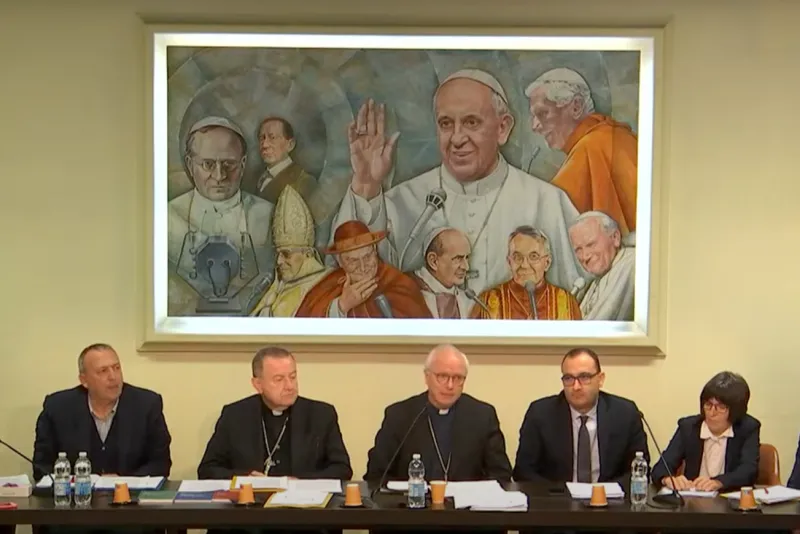
Denver Newsroom, Jul 21, 2020 / 03:01 am (CNA).- The Calix Society serves as a way for Catholics undergoing a 12 Step program to integrate their faith into their recovery, staying sober and sharing in a community where they can identify Christ as their higher power.
While it is not a replacement for other recovery programs, the Calix Society is a supplemental course for people struggling with addiction to embrace their Catholic faith.
The gatherings, which are held monthly, fortnightly, or weekly, are composed of two parts – spiritual practice and discussion. The meeting will begin with a spiritual exercise, such as Mass or the rosary. Then the group will either read from books like the Twelve Steps, have speakers share their faith, or watch faith-filled videos.
Ken Johnston, who is almost 29 years sober and is the program’s treasurer, told CNA that pursuing spirituality is helpful to the recovery process, and Calix allows recovering addicts to participate in a community that expresses a desire for the Catholic faith.
“Most people that eventually find us … say that this is exactly what they've been looking for. They're looking for people that are in recovery that understand their situation and want to be able to share their Catholic faith,” he said.
Beginning in 1947, Calix was developed in Wisconsin after Bill Montroy and several other AA members started to attend daily Mass with Father Pat – a priest in the Twin Cities who also struggled with alcoholism.
As the program grew, Mass was moved to Saturday mornings. Afterward, they would get breakfast at a nearby restaurant, and then they would gather to discuss and read on spiritual topics.
“The five of them would get together each morning for Mass at five o'clock. Father Pat stayed sober and the five men grew in their Catholic faith. They knew that they were on to something here,” said Johnston.
“It was like a combination of the 12 step program plus their Catholic faith that was giving them a spiritual experience that neither one could give them by itself.”
During the 1970s, the program had a couple hundred Calix units throughout the United States. He said numbers have dwindled to about 30 units, with a couple of groups in the United Kingdom.
Last summer, said Johnston, the program opened up its meeting to all recovering groups, including Sexaholics Anonymous, Narcotics Anonymous, and Al-Anon – a support group for family members of recovering addicts. He said the changes to Calix’ program coincides with the national opioid crisis.
“In light of the opioid addiction or the opioid crisis that's going on, [we] basically expanded our scope to include all 12 step programs,” he said.
“The thing that everybody has in common is the 12 step program. Then Calix fulfills the need of the higher power in order to achieve sobriety.”
Calix is not a substitute for rehab or an anonymous meeting, he said, noting that all members are required to have some recovery time under their belt before they are allowed to join. He said it is instead an additional tool for Catholics to discover more about their faith while being involved with outside recovery efforts.
Johnston quoted the founder, Montroy, saying: “A.A. restores your health and saves you from an early grave. Calix restores your soul and puts you on the road to heaven.”
He said Alcoholics Anonymous was developed as a Christian organization in 1935. However, as AA progressed, it pushed for a relationship with a “higher power” as it is understood by the attendee. He said Calix allows people to identify their higher power with Christ and express that among a Catholic community.
“They came up with a generic higher power and basically drove Jesus Christ out of the rooms. That's where Calix came in. So people want to be able to say it in a group setting, ‘my higher power is Jesus Christ, and I want to get to know him better.’”
He said these people are able to share their similar struggles and receive support from a like-minded community. On the road to recovery, he said, these people will still have to face difficult situations, like losing a spouse or a child, but they are able to embrace the faith rather than negative addictions.
“We still face a lot of the same issues. Some people experience even more horrific situations in sobriety than they encountered when they were active in or drinking or drug use … The beauty of having that spiritual connection is that now you can deal with it without having to drink or use a drug or something else.”
If you value the news and views Catholic World Report provides, please consider donating to support our efforts. Your contribution will help us continue to make CWR available to all readers worldwide for free, without a subscription. Thank you for your generosity!
Click here for more information on donating to CWR. Click here to sign up for our newsletter.




Leave a Reply